最难初等平面几何题系列及其解法的一个介绍性材料
来源:互联网 发布:gson 生成json 编辑:程序博客网 时间:2024/04/29 16:15
国内很多人把这个问题叫做“汤普森”问题,如果英文Thompson的话,Thompson问题其实是另有所指的。
维基百科里面是这么说的:
The objective of the Thomson problem is to determine the minimum electrostatic potential energy configuration of N electrons constrained to the surface of a unit sphere that repel each other with a force given by Coulomb's law. The physicist J. J. Thomson posed the problem in 1904[1] after proposing an atomic model, later called the plum pudding model, based on his knowledge of the existence of negatively charged electrons within neutrally-charged atoms.
大致是,利用库伦定律作为约束,在一个单位球表面放 N 个带有相同电荷的电子时,如何放置这些电子,可以使这N个电子的势能最小(也就是最稳定的平衡态问题)。
Wolfram mathworld上面说法跟这个类似:
The Thomson problem is to determine the stable equilibrium positions of n classical electrons constrained to move on the surface of a sphere and repelling each other by an inverse square law. Exact solutions for n=2 to 8 are known, but n=9 and 11 are still unknown.
大意是,确定在球表面上相互之间受反平方库伦斥力、可以自由移动的n个电子的稳定平衡位置的问题;对于n=2, 8的情形已经有解;但n=9, 11的情形尚未解决。
国内参加数学竞赛的同学把下面的平面几何证明问题也叫做 “Thompson problem” , 给出的理由是,这是一个1920年以前就出现过的问题,但是直到1950年代前后才有一位姓Thompson的用辅助正多边形方法给出了第一个纯几何解法,所以这样命名。——这个说法只见到中文,没见到英文版本。
如果这样, 费马猜想是不是该叫做 威尔斯问题? ——这种命名方法显然非常无厘头,不符合正常的逻辑、也不符合国际上命名的惯例,但国内居然都敢这么叫。我知道很多错别字都是这么变通假字的,比如,李玟 的 玟, 本来只有mín ,曝光的曝 pù , 现在大陆教法已经统一成 李文,暴光了。——歌手李玟的这个艺名之前,真名叫做“李美林”,mei 和 lin 前者取声母、后者取韵母, 刚好是 min; 但是如果要名字通俗、流行,似乎只能接受这个;曝光这个标准读音,至少在台湾(港澳?)地区读法正确,古汉语基础稍好的也不至于读bao.但是因为这么读的人太多了,现在这些在大陆反而是标准的读法,连CCTV新闻联播都这么读。
不过这些谬误,在我这里始终是谬误;即使接受的人已经很多,还是要揭揭老底的。
下面转发的,主要是“正多边形辅助居然可以解这类问题”
https://www.cut-the-knot.org/triangle/80-80-20/index.shtml
The 80-80-20 Triangle
Several triangles due to their specific properties served as a source for research, wonderment, and a variety of problems. Some, likeequilateral, right isosceles, golden, Egyptian, 30-60-90, are very well known. One triangle that deserves more recognition has probably entered mathematical folklore some 100 years ago. Tom Rike of Berkley Mathematical Circlesmentions its appearance in the Mathematical Gazette, Volume 11 (1922), p. 173. (His online article also provides additional references.) This is the 80-80-20 (or sometimes 20-80-80) triangle, i.e., the isosceles triangle with the apex angle of 20° and the base angles of 80°.
The original problem gave rise to a few modifications; and each of them has been solved in many, many ways. I'll be adding solutions and perhaps problems related to the original one. Any assistance is welcomed.
This page is to serve as the portal for this undertaking.

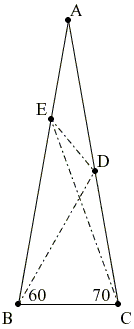


 Original problem60-70 variantShort segmentsLong segmentsIsosceles partition
Original problem60-70 variantShort segmentsLong segmentsIsosceles partition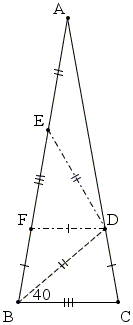
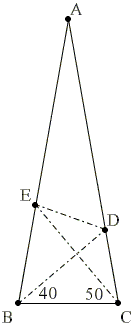

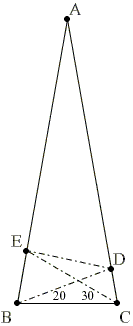
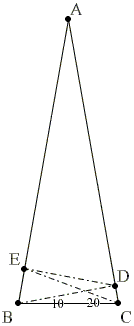 Another partition40-50 Variant30-40 variant20-30 variant10-20 variant
Another partition40-50 Variant30-40 variant20-30 variant10-20 variantOriginal problem
Let ABC be an isosceles triangle
Solutions
60-70 Variant
Let ABC be an isosceles triangle
Solutions
Short segments equality
ABC is an isosceles triangle with vertex angle
Solutions
Long segments equality
ABC is an isosceles triangle with vertex angle
Solutions
Partition into adjacent isosceles triangles
The 80-80-20 triangle can be partitioned into isosceles triangle with bases on the legs of the given triangle. For what other apex angles A can isosceles triangle ABC be tessellated with isosceles triangles in a similar manner?
Solutions
Partition that starts with a base angle bisector
The 80-80-20 triangle can be partitioned in a curious way: let BD, with D on AC, bisect angle B. Then
Solutions
This problem admits an inverse.
40-50 Variant
Let ABC be an isosceles triangle
Solutions
30-40 Variant
Let ABC be an isosceles triangle
Solutions
20-30 Variant
Let ABC be an isosceles triangle
Solution
10-20 Variant
Let ABC be an isosceles triangle
Solutions
References
- T. Rike, An Intriguing Geometry Problem, Berkeley Math Circle, May 5, 2002.
- H. S. M. Coxeter and S. L. Greitzer, Geometry Revisited, MAA, 1967.
- R. Honsberger, Four Minor Gems from Geometry, Mathematical Gems II, MAA, 1976.
- R. Honsberger, Three Solutions to a Variation on an Old Chestnut, Mathematical Chestnuts from Around the World, MAA, 2001.
- C. Knop, Nine Solutions to One Problem, Kvant, 1993, no 6.
- R. Leikin, Dividable Triangles - What Are They?, Mathematics Teacher, May 2001, pp. 392-398.
- V. V. Prasolov, Essays on Numbers and Figures, MAA, 2000.
|Contact||Front page||Contents||Store|
Copyright © 1996-2017 Alexander Bogomolny
- 最难初等平面几何题系列及其解法的一个介绍性材料
- 一道初等平面几何竞赛题的暴力解法
- 费马大定理的初等解法
- 一道初等几何题的解法的分析
- 一道“求阴影面积”初等几何题的“凑面积、做加减”解法
- 一个Matlab 2010a在线讲座材料的介绍
- 一个初等数论问题的编程
- 物理方法解决数学问题(一):从一个简单的平面几何题谈起
- 复数在初等平面几何问题中的应用案例
- 泛型介绍【入门的好材料】
- 泛型介绍【入门的好材料】
- 泛型介绍【入门的好材料】
- 一些负载均衡器的介绍材料
- 一个笔试题的递归解法
- 用初等解法解特定差分方程(韦达定理的应用)
- POJ 1556 (平面几何 最短路)
- 学习struts的一个初等的小例子
- 学习struts的一个初等的小例子
- Java中遍历map的四种方式
- MFC:去掉工具栏边框(与菜单栏之间的分割线)
- I/O流
- iOS获取当前app的名称和版本号
- Nginx代理功能与负载均衡详解
- 最难初等平面几何题系列及其解法的一个介绍性材料
- 《.NET 设计规范》第 8 章:使用规范
- c++-new与malloc的区别
- java中的匿名内部类
- 【ML--12】聚类---K-means算法
- Android系统篇之----Android中的run-as命令引出升降权限的安全问题(Linux中的setuid和setgid)
- 安卓的手势识别框架
- android 监听软键盘的弹出与隐藏
- 总结javaweb遇到的问题



